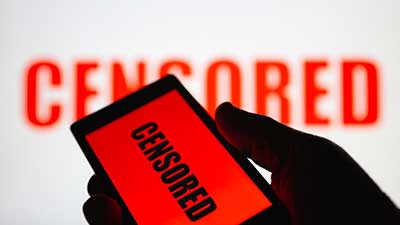Date: 28/01/2023
Relevance: GS-2: Indian Constitution—Historical Underpinnings, Evolution, Features, Amendments, Significant Provisions and Basic Structure
Key Phrases: Information Technology Rules, 2021, Section 69A, natural justice, the constitutionality of the direction, emergency blocking, self-censorship, transparency when convenient, centralisation of executive power.
Why in News?
- The Ministry of Information and Broadcasting has blocked over 50 tweets on Twitter that carried a link to the BBC documentary.
- In an order on January 20, 2023, the government used emergency powers under the Information Technology Rules, 2021 and Section 69A of the Information Technology Act, 2000 to direct Twitter and YouTube to disable access to the documentary within India and prevent its re-upload.
- There are concerns over natural justice, the constitutionality of the direction, and how the IT Rules are in a perpetual state of the proposed amendment.
Opacity Supersedes Natural Justice:
- Natural justice is a fundamental principle in public law when decisions affect fundamental rights such as the freedom of speech.
- The Supreme Court of India, in the case of the Cricket Association of Bengal, recognised that “the right to receive and impart information is implicit in free speech”.
- Therefore, any restriction must ordinarily issue a show cause notice, provide the opportunity of defence to the author, and record reasons in an order that is made public.
- Providing reasons allows for the author or publisher, as well as the recipient of the information, to seek judicial remedies and act as a check for constitutionally permitted censorship.
Blocking Powers Under Section 69A:
- Such practice is contrary to the directions of the Supreme Court in the case of Shreya Singhal vs the Union of India.
- In the case it upheld that blocking powers under Section 69A subject to “reasons have to be recorded in writing in such blocking order so that they may be assailed in a writ petition”.
- However, blocking orders are marked as “secret” or “confidential”, and then transmitted directly to service providers, making it difficult for the authors an opportunity of defence and the general public to challenge them.
Blocking Order:
- Many a time, press releases are selectively issued instead of disclosing the text of orders. This type of “transparency when convenient” becomes a form of opacity.
- There has been no official press release for the online blocking of the BBC documentary.
On Whether It Is A Perpetual Emergency:
- Emergency Blocking:
- The blocking has been made under Rule 16(3) of the IT Rules and Section 69(A) of the IT Act, 2000 which allow for “emergency blocking”.
- However, the term “emergency” itself is not legislatively defined, but following the dictionary, the meaning would mean “a dangerous situation requiring immediate action”.
- It permits an expedited process that weakens the already minimal checks by bypassing a committee and also eliminating the opportunity to be heard.
- Court Directions:
- In August 2021, the Bombay High Court, in a petition by The Leaflet and Nikhil Waghle, suspended Rules 9(1) and 9(3) that establish a code of ethics for online news platforms and a three-tier grievance redress mechanism headed by the central government.
- In its interim order it counselled, “it is healthy to invite criticism of all those who are in public service for the nation to have structured growth”.
- The directions of the High Courts still hold the force of law. The officials need to be prudent and avoid undermining their letter and spirit.
- However, there is an increased use of emergency powers, as seen in
the eight press releases referred to earlier on questionable grounds.
- For instance, the BBC documentary has been described by public authorities as “propaganda” reflecting “a colonial mindset”.
An ‘Everything Law’:
- Centralisation of executive power:
- The IT Rules first notified on April 11, 2011, by the Ministry of Electronics and IT (MeitY) has undergone a radical change.
- This can be attributed to the centralisation of executive power rather than a rapid metamorphosis of the subject matter for regulation.
- On February 25, 2021, the rules were amended drastically to increase government control over online platforms and news publishers.
- Grievances and privacy:
- Other changes included the creation of grievance officers for social media companies and traceability requirements to increase censorship and break privacy-protecting technologies such as encryption.
- Self-censorship:
- It also required news publishers to follow a vague moral code of self-censorship that permitted grievances to be escalated to the government, leading to stay orders by High Courts.
- Government censorship body:
- On October 28, 2022, rather than address such constitutional concerns, another set of amendments created a government censorship body sitting in appeal of all content moderated by social media companies.
- Self-regulatory system:
- On January 2, 2023, MeitY wanted to create a self-regulatory system for online gaming and gambling companies, which is illegal on several grounds, including federalism, given that legislation on it is a State subject. Despite reasoned criticism, MeitY pushed ahead.
Conclusion:
- There has been a gradual and inexorable expansion of IT Rules into the ‘everything law’, leading one to ask where free debate and expression are in a digital and democratic India.
- Today, it covers violations of fundamental rights by creating the pretence of a procedure that permits unlimited censorship powers that are often left to unbounded imagination and capriciousness.
- There is a need to rationalise every reform done regarding the censorship of media using consensus-building and a wider stakeholder approach to ensure the guarantee of the right to receive and provide information.
Source: The Hindu
Mains Question:
Q. “The gradual and inexorable expansion of IT rules threatens free debate and expression in a digital and democratic India.” Critically analyse in the context of the recent ban on a BBC documentary.(250 Words).






















